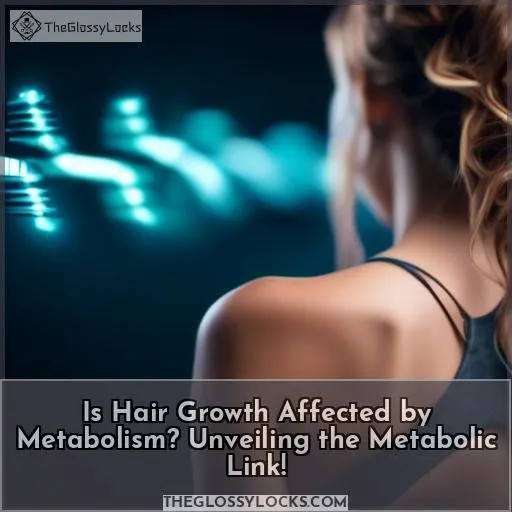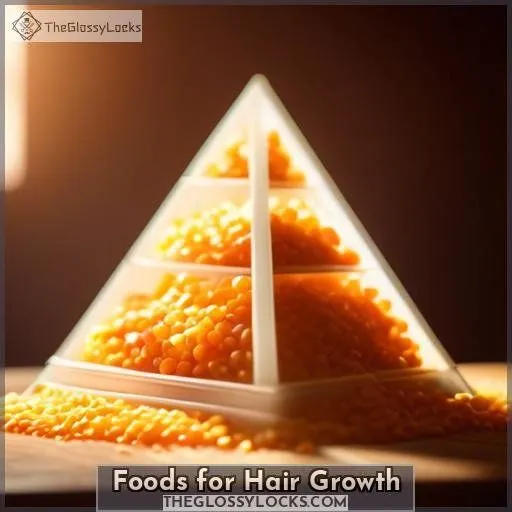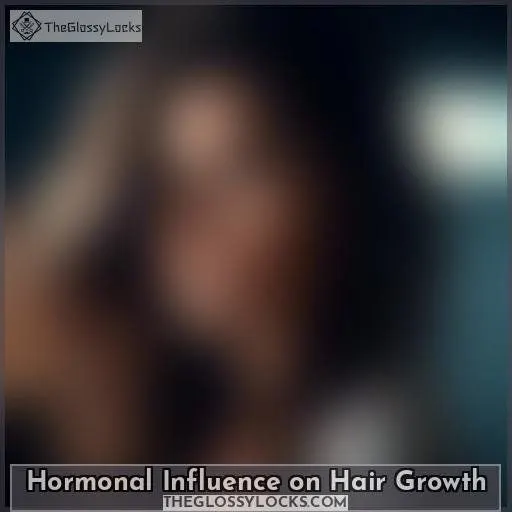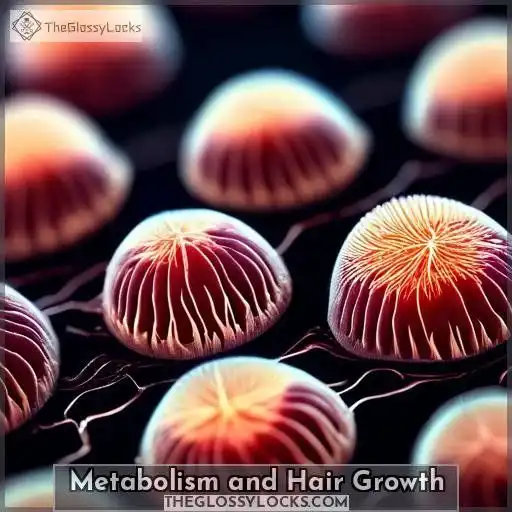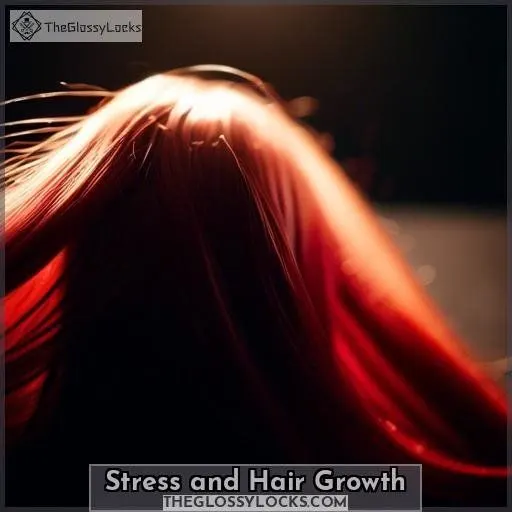This site is supported by our readers. We may earn a commission, at no cost to you, if you purchase through links.
Yes, your hair growth is indeed influenced by your metabolism. Proper metabolic function is crucial for ideal hair growth. Androgens, the main regulators of hair growth in humans, depend on a healthy metabolism to work their magic.
Disruptions in key metabolic pathways, such as the conversion of testosterone to DHT, can have harmful effects on hair follicles and cyclic regulation.
Additionally, hormones like growth hormone and melatonin, which control hair growth, are closely linked to your body’s overall metabolic state.
Table Of Contents
Key Takeaways
- Proper metabolic function is crucial for optimal hair growth.
- Androgens, which regulate hair growth, depend on a healthy metabolism to work effectively.
- Disruptions in key metabolic pathways can negatively impact hair follicles and their cyclic regulation.
- Nutrients like iron, omega-3 fatty acids, and collagen are essential for maintaining healthy hair follicles and promoting new growth.
Is Hair Growth Affected by Metabolism?
Yes, hair growth is affected by metabolism. Metabolism plays a critical role in various diseases, including hair loss, and changes in metabolites can affect hair growth.
For example, some metabolites associated with carbohydrate metabolism, such as alpha-ketoglutarate (α-KG) and alpha-ketobutyrate (α-KB), can stimulate hair growth when activated by autophagy.
Obesity-induced stress, such as that caused by a high-fat diet, can accelerate hair loss by depleting hair follicle stem cells (HFSCs), which indicates that metabolic changes may affect hair growth via stem cell inflammatory signals.
Additionally, psychological stress can also affect metabolic levels, but the underlying molecular mediators aren’t well defined.
Nutrients for Hair Growth
You’re absolutely right to reflect on the role of nutrients in hair growth. After all, certain nutrients like iron, omega-3 fatty acids, and collagen are essential for maintaining healthy hair follicles and promoting new growth. Without adequate intake of these key nutrients, you may experience increased shedding, thinning, or a general lack of luster in your hair.
Iron: Deficiency Can Lead to Hair Shedding and Thinning
Iron is an essential mineral that plays a critical role in various bodily functions, including the production of red blood cells and the transport of oxygen to cells, including those in the hair follicles. A deficiency in iron can lead to anemia, which can cause hair loss due to the body prioritizing oxygen supply to important organs over the hair follicles. This can result in a condition called telogen effluvium, where intense physical stress or illness causes widespread thinning of the hair in both men and women.
To address iron deficiency-related hair loss, a doctor may recommend iron supplements to increase iron levels in the body. These supplements can help restore iron stores and potentially reverse hair loss after a few months of use. Additionally, dietary changes can help increase iron intake, with iron-rich foods like red meat, chicken, fish, leafy green vegetables, and legumes being recommended. Iron-fortified cereals and foods can also contribute to iron intake.
It is essential to consult a doctor to determine the cause of hair loss and discuss appropriate treatment options. In some cases, hair loss may be due to factors other than iron deficiency, such as androgenetic alopecia or stress-related factors.
Omega-3 Fatty Acids: Associated With Thriving Hair
Omega-3 fatty acids, particularly EPA (eicosapentaenoic acid) and DHA (docosahexaenoic acid), have been associated with thriving hair.
These essential fatty acids may improve hair health through various mechanisms, such as improved scalp health, reduced inflammation, increased blood flow, hydration, strength, and elasticity, and decreased hair loss.
Incorporating omega-3-rich foods like fatty fish, flaxseeds, chia seeds, walnuts, and hemp seeds into your diet or taking omega-3 supplements like fish oil or algal oil capsules may stimulate hair growth and improve hair density, protecting it from breakage and enhancing its texture.
Collagen: Supports Hair Growth and Strength
Collagen is a critical structural protein that performs a fundamental role in preserving the integrity and strength of our hair. It’s a primary component of the extracellular matrix, which provides sustenance and structure to various tissues, including the skin and hair follicles. Consuming collagen can facilitate improved hair growth by supplying the necessary building blocks for hair proteins and fortifying the skin that harbors hair follicles. Here are five ways collagen may contribute to hair growth:
- Building hair proteins: Collagen encompasses the amino acids proline, glycine, and hydroxyproline, which are indispensable for synthesizing hair proteins such as keratin. By consuming collagen, your body can utilize these amino acids to construct more robust hair proteins.
- Preventing hair follicle damage: Collagen contributes to the protection of hair follicles from damage induced by free radicals, which are compounds that can harm cells, proteins, and DNA. This can mitigate hair loss attributable to compromised follicles.
- Slowing down thinning and greying: As we age, our collagen levels decline, resulting in a loss of elasticity in the skin and hair follicles. Consuming collagen can assist in decelerating this process, potentially minimizing hair thinning and premature greying.
- Strengthening hair follicles: Collagen is a structural protein that aids in maintaining the integrity of the hair follicle. By providing supplemental collagen, you can fortify the follicles, potentially enhancing hair growth and reducing hair loss.
- Enhancing hair elasticity: Collagen is renowned for its elasticity-enhancing properties. By consuming collagen, you may be able to improve the elasticity of your hair, rendering it more resilient to breakage and damage.
To incorporate collagen into your diet, consider consuming collagen-rich foods like bone broth, eggs, and leafy greens, or consider taking collagen supplements. Remember, while collagen may contribute to hair growth, it’s imperative to sustain a balanced diet and overall health to ensure favorable hair growth.
Foods for Hair Growth
You’d be wise to incorporate vitamin- and mineral-rich foods into your diet if you’re aiming to promote healthy hair growth.
These foods supply essential compounds that play key roles in supporting the hair growth cycle.
Such nutrient-dense foods include eggs, berries, spinach, avocados, and leafy greens.
They provide protein, biotin, antioxidants, collagen precursors, vitamins A, C, and E, as well as iron.
Eggs: Rich in Protein and Biotin
Switching gears from the broader spectrum of nutrients, let’s crack into how eggs, packed with biotin and protein, are a hair growth powerhouse. They’re the secret ingredient for lush locks.
Berries: High in Antioxidants and Collagen Production
Berries, a delectable delight, are brimming with antioxidants and collagen-enhancing qualities. These vital nutrients play a pivotal role in hair growth, fostering follicle vitality and resilience. Integrating berries into your diet can aid in maintaining a harmonious metabolism, thus promoting hair health in its entirety.
Spinach: Vitamin A, Vitamin C, and Iron Source
Spinach: The Green Powerhouse for Hair Growth
Spinach is a nutrient-dense green leafy vegetable that’s packed with essential vitamins and minerals that can boost hair growth and prevent hair loss. It’s a great source of iron, which plays a critical role in hair growth by improving blood circulation and promoting the distribution of oxygen to hair follicles. Spinach is also rich in vitamin A, which is necessary for cell growth and supports hair growth, and vitamin C, which helps in collagen production and iron absorption, both of which are essential for healthy hair.
Iron is a key component in producing red blood cells, which carry oxygen to hair follicles, ensuring they receive the nutrients they need to thrive. A deficiency in iron can lead to anemia, which is associated with hair loss. By consuming spinach regularly, you can help maintain healthy hair and prevent hair fallout.
In addition to its hair growth benefits, spinach is also rich in other nutrients like folate, vitamin B3, vitamin B-6, and vitamin K, all of which contribute to overall hair health. It’s worth noting that consuming too much vitamin A can lead to hair loss, so it’s essential to maintain a balanced diet and not overdo it.
To incorporate spinach into your hair growth routine, you can try adding it to your diet in various ways. You can consume it raw in salads, cook it as a side dish, or blend it into smoothies. For a more direct application, you can also create a spinach hair pack by mixing spinach with honey and a carrier oil like coconut, castor, or olive oil. Apply this mixture to your scalp and hair, leave it on for 30 to 40 minutes, and then rinse it off with cool or lukewarm water and a mild sulfate-free shampoo.
Avocado: Rich in Vitamin E and Antioxidants
Avocado, a cherished fruit, isn’t only a mainstay in your salad or a sought-after ingredient in smoothies; it also holds remarkable advantages for your hair. This superfood is replete with vitamin E and antioxidants, which are indispensable for sustaining healthy hair growth.
Vitamin E, an antioxidant, plays a pivotal role in safeguarding your hair from harm caused by free radicals, which can be detrimental to your locks. It also aids in fortifying hair follicles, minimizing the likelihood of breakage and split ends. Avocado‘s antioxidant capabilities can neutralize free radicals, which can induce oxidative stress and damage to the scalp, leading to compromised hair quality and fewer hair follicles.
Moreover, avocado oil is a humectant that effectively moisturizes hair, restoring hydration and maintaining its smoothness and luster. The presence of potassium and magnesium in avocado oil assists in replenishing the moisture in your hair, rendering it more manageable and less susceptible to damage.
Integrating avocado into your diet or utilizing avocado-based hair products can confer numerous benefits for your hair, ranging from nourishing and strengthening to softening and protecting it from heat styling damage. So, the next time you’re preparing a meal or seeking a hair treatment, contemplate adding avocado to your list of ingredients – your hair will express its gratitude!
Leafy Greens: Rich in Iron and Other Nutrients
Leafy greens are a rich source of iron, a mineral that plays a critical role in hair growth.
Iron is essential for promoting blood circulation, which is necessary for delivering oxygen and nutrients to hair follicles.
When iron levels are insufficient, hair follicles don’t receive the necessary nutrients, leading to hair loss and weakened strands.
To guarantee optimal hair health, consider incorporating dark green leafy vegetables such as spinach, amaranth, and moringa leaves into your diet.
These vegetables aren’t only rich in iron but also contain other essential nutrients like folate, vitamins A and C, and biotin, which support hair growth and strength.
Hormonal Influence on Hair Growth
You’re aware that hormones play a vital role in regulating hair growth, with androgens like testosterone acting as the primary controllers. However, other hormones such as growth hormone, melatonin, and cortisol also have a substantial influence on hair growth, either strengthening androgen effects or directly impacting follicle function and cycling.
Androgens: Primary Regulators of Proper Hair Growth in Humans
Androgens, the maestros of hair growth, play a pivotal role in the symphony of your hair’s life cycle. In the case of androgenetic alopecia, tuning down the androgen’s volume with 5-reductase inhibitors can keep the music playing, ensuring your hair’s encore performance isn’t prematurely silenced.
Growth Hormone: Enhances Androgen’s Influence on Sexual Hair Growth
As a human, you’re probably aware that hormones play an indispensable role in your body’s functions, including hair growth. One of the primary hormones responsible for proper hair growth in humans is androgen, a group of hormones that includes testosterone. Androgens are essential for the development of secondary sexual characteristics during puberty, such as body hair and the growth of facial hair in males.
However, androgens also have a paradoxical effect on hair growth. While they stimulate hair production in some areas, they can simultaneously inhibit specific scalp follicles, leading to androgenetic alopecia, or balding. This dual effect is due to the presence of androgen receptors in hair follicles, which allows androgens to exert their effects on hair growth.
Now, let’s talk about growth hormone (GH), another hormone that influences hair growth. GH is a protein secreted by the pituitary gland in the brain and helps increase height, grow bones, cartilage, and muscles, and impacts the metabolism of protein, fat, and sugar. In the context of hair growth, GH helps maintain the anagen phase (or active growing phase) of the hair growth cycle. When the levels of insulin-like growth factor-1 (IGF-1), which is stimulated by GH, are low, it can cause hair loss. Additionally, somatostatin (SST) therapy, which negatively impacts the secretion of growth hormones, can also cause hair loss, although it’s reversible.
Melatonin: Affects Hair Pigmentation and Growth
Melatonin, a hormone mainly produced in the pineal gland, plays a significant role in regulating our sleep-wake cycles and has been linked to hair growth. Studies suggest that topical application of melatonin may aid in hair growth, especially for those suffering from hair loss conditions like androgenetic alopecia.
Melatonin’s potential benefits for hair growth are attributed to its ability to regulate circadian rhythms and sleep quality, which in turn can influence hair density. Some research indicates that melatonin may extend the active growth stage of hair follicles, known as the anagen phase, and potentially increase hair density.
Here are four key points to note:
- Melatonin and Sleep: Melatonin is primarily known for its role in regulating sleep cycles, and research suggests that adequate sleep is essential for hair growth and overall health.
- Circadian Rhythm: Melatonin is part of our body’s circadian rhythm, which influences various bodily functions, including hair growth.
- Hair Growth Regulation: Melatonin may play a role in regulating hair growth by interacting with estrogen, another hormone important for hair growth, and potentially extending the anagen phase of the hair cycle.
- Antioxidant Properties: Melatonin’s potent antioxidant properties may help protect hair follicles from oxidative stress, which can lead to hair loss.
While more research is needed to fully understand the relationship between melatonin and hair growth, topical application of melatonin has shown potential in promoting hair growth and potentially increasing hair density.
Cortisol: Affects Hair Follicle Function and Cyclic Regulation
Cortisol: Affects Hair Follicle Function and Cyclic Regulation (Hormonal Influence on Hair Growth)
Cortisol, a hormone made by the adrenal glands, plays a significant role in hair follicle function and cyclic regulation. When cortisol levels are elevated due to chronic stress, it can disrupt the normal hair growth cycle, leading to hair loss. This disruption occurs because cortisol reduces the synthesis and accelerates the degradation of hyaluronan and proteoglycans, which are essential for maintaining the health and function of hair follicles.
Cortisol levels are elevated during the flight-or-fight response, which is triggered by stress. When cortisol levels are high, the adrenal glands produce less of the hormones that support healthy hair growth, leading to an imbalance in hormone levels and hair loss. Additionally, high cortisol levels can lead to a decrease in cell regeneration, impaired mental function, decreased metabolism, and a weakened immune system, further contributing to hair loss.
To manage cortisol levels and support hair growth, stress management techniques such as mindfulness meditation, deep breathing, and relaxation exercises can be helpful. These practices can lower cortisol levels, improve blood circulation to the scalp, and enhance overall well-being, all of which contribute to healthy hair growth.
Metabolism and Hair Growth
Metabolism plays a vital role in hair growth, particularly in the context of androgenetic alopecia.
Androgens, such as testosterone and dihydrotestosterone (DHT), are essential for proper hair growth in humans.
However, disturbances in androgen metabolism or target organ sensitivity may underlie androgenetic alopecia.
For instance, 5α-reductase inhibitors like finasteride have shown promise in treating this condition by inhibiting the conversion of testosterone to DHT.
Understanding the metabolic factors involved in hair growth can provide new therapeutic opportunities for patients with androgenetic alopecia.
Stress and Hair Growth
You’re likely well aware that stress takes a toll on your hair’s health and appearance. Cortisol, the primary stress hormone, disrupts the normal functioning of hair follicles and alters their growth cycle, leading to excessive shedding and thinning.
Stress Affects Hair Follicle Function and Cyclic Regulation
Stress affects hair follicle function and cyclic regulation through the release of cortisol, a hormone that interacts with hormones and can cause hair to enter the resting phase.
This phase, known as telogen, is when hair is more easily shed.
Chronic stress can also prolong the resting phase, maintaining hair follicles in an extended resting phase and potentially causing hair loss.
Cortisol Disrupts Normal Hair Follicle Function
Cortisol, a hormone released during stress, can disrupt normal hair follicle function. This hormonal imbalance can alter metabolic pathways, potentially contributing to hair loss.
High cortisol levels can lead to a hormonal imbalance, affecting hair growth.
Bioavailable proteoglycan supplementation shows promise as a therapeutic treatment for stress-related hair loss, as it can help regulate cortisol levels and support hair follicle health.
Frequently Asked Questions (FAQs)
Can dehydration impact hair follicle health?
Dehydration can deplete the life force of your hair follicles, leaving you parched and lifeless. Quench those roots, and your hair will remain vibrant and flourishing.
Does scalp massage stimulate hair production?
Scalp massage has been shown to stimulate blood flow, which may nourish hair follicles and promote hair growth. Give it a try – just don’t overdo it. A little goes a long way!
Are hair growth patterns hereditary?
You’re right, hair growth is largely hereditary. Your genes determine the thickness, rate, and pattern of your hair. While diet and stress can play a role, your follicles’ DNA primarily calls the shots.
Can seasonal changes affect hair cycles?
Did you know that seasonal changes can indeed affect your hair cycle? Yep, the cold weather and changing daylight hours can trigger your follicles to shift between growth and shedding phases. Pretty fascinating, right?
Does exercise influence hair growth rate?
Exercise can stimulate hair growth by boosting circulation and nutrient delivery to follicles. But overtraining may trigger stress and disrupt the hair cycle. Find the sweet spot to keep your locks luscious!
Conclusion
Akin to a well-oiled engine, your metabolism is the driving force behind your hair’s growth and vitality. By nourishing your body with the right nutrients and managing stress, you can rev up your metabolic engine and watch your beautiful locks flourish.

